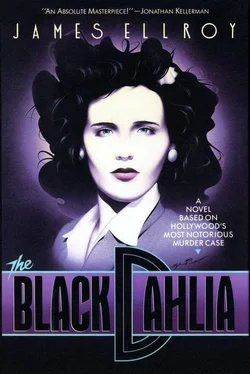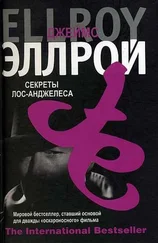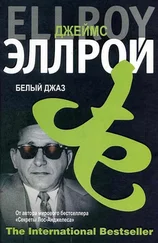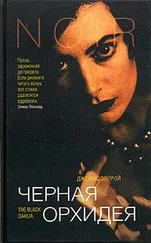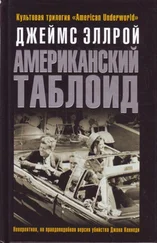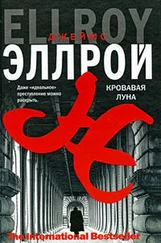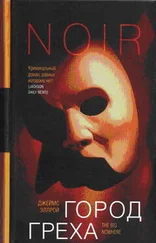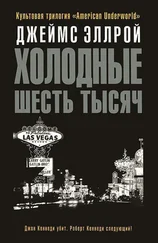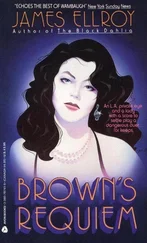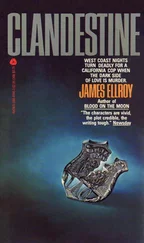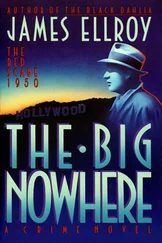I left the manse and killed time making rounds of old haunts. I checked out the rest home — my father didn’t recognize me, but looked full of malicious spunk. Lincoln Heights was rife with new houses — prefab pads waiting for tenants — “No Down Payment” for GIs. The Eagle Rock Legion Hall still had a sign ballyhooing Friday night boxing, and my Central Division beat was still winos, rag suckers and Jesus shriekers. At twilight, I gave in: one last shot at the brass girl before I took her mommy down; one last chance to ask her why she was still playing Dahlia when she knew I’d never touch her again.
I drove to the 8th Street bar strip, parked at the corner of Irolo and waited with an eye on the Zimba Room entrance. I was hoping that the valise I’d seen Madeleine carrying in the morning didn’t mean a trip somewhere; I was hoping her Dahlia prowl of two nights ago wasn’t a one-shot deal.
I sat there eyeballing foot traffic: servicemen, civilian boozehounds, neighborhood squares going in and out of the hash house next door. I thought of packing it in, then got frightened of the next stop — Ramona — and stuck. Just past midnight Madeleine’s Packard pulled up. She got out — carrying her valise, looking like herself, not Elizabeth Short.
Startled, I watched her walk into the restaurant. Fifteen minutes passed slowly. Then she sashayed out, Black Dahlia to the nines. She tossed her valise in the Packard’s backseat and hit the Zimba Room.
I gave her a minute’s slack, then went over and peered in the doorway. The bar was serving a skeleton crew of army brass; the zebra-striped booths were empty. Madeleine was drinking by herself. Two soldiers were primping at stools down from her, getting ready to make the big move. They swooped a half second apart. The dump was too deserted for me to hold surveillance in; I retreated to the car.
Madeleine and a first lieutenant in summer dress khakis walked out an hour or so later. Per her old MO, they got in the Packard and headed around the corner to the 9th and Irolo auto court. I was right behind them.
Madeleine parked and walked to the manager’s hut for the key; the soldier waited by the door of room twelve. I thought of frustration: KMPC on loud, venetian blinds down to the sill. Then Madeleine left the office, called to the lieutenant and pointed across the courtyard to a different unit. He shrugged and went over; Madeleine joined him and opened the door. The light went on and off inside.
I gave them ten minutes, then moved to the bungalow, resigned to big band standards and darkness. Moans were coming from inside, unaccompanied by music. I saw that the one window was open two feet or so, dried paint on the runner holding it stuck. I found shelter beside a trellis overgrown with vines, squatted down and listened.
Heavier moans, bed springs creaking, male grunts. Her love sounds reaching fever pitch — stagy, more soprano than when she was with me. The soldier groaning hard, all noise subsiding, then Madeleine, speaking with a feigned accent:
“I wish there was a radio. Back home all the motels had them. They were bolted down and you had to put dimes in, but at least there was music.”
The soldier, trying to catch his breath: “I heard Boston’s a nice town.”
I placed Madeleine’s fake voice then: New England blue collar, the way Betty Short was supposed to speak. “Medford’s not nice, not nice at all. I had one lousy job after another. Waitress, candy girl at a theater, file clerk at a factory. That was why I came to California to seek my fortune. Because Medford was so awful.”
Madeleine’s “A’s” were getting broader and broader; she sounded like a Boston guttersnipe. The man said, “You came out here during the war?”
“Uh-huh. I got a job at the Camp Cooke PX. This soldier beat me up, and this rich man, this award-winning contractor, he saved me. He’s my stepdaddy now. He lets me be with whoever I want to be with so long as I come home to him. He bought me my nice white car and all my nice black dresses, and he gives me back rubs ’cause he’s not my real daddy.”
“That’s the kind of dad to have. My dad bought me a bicycle once, and he gave me a couple of bucks toward a soap box derby racer. But he never bought me any Packards, that’s for damn sure. You’ve got yourself a real sugar daddy, Betty.”
I knelt down lower and peered through the window crack; all I could see were dark shapes on a bed in the middle of the room. Madeleine/Betty said, “Sometimes my stepdaddy doesn’t like my boyfriends. He never makes a fuss, because he’s not my real daddy and I let him give me backrubs. There was this one boy, a policeman. My stepdaddy said he was wishy-washy with a mean streak. I didn’t believe him, because the boy was big and strong, and he had these cute buck teeth. He tried to hurt me, but Daddy settled his hash. Daddy knows how to deal with weak men who suck around money and try to hurt nice girls. He was a big hero in the First World War and the policeman was a draft dodger.”
Madeleine’s accent was slipping, moving into another voice, low and guttural. I braced myself for more verbal lashing; the soldier said, “Draft dodgers should either be deported to Russia or shot. No, shooting’s too merciful. Hanged by the you know what, that’s more like it.”
Madeleine, a vibrato rasp, a perfect Mexican accent: “An axe ees better, no? The policeman have a partner. He tie up some loose ends for me — some notes I should not ‘ave lef’ for a not so nice girl. The partner beat up my stepdaddy an’ run away to May-hee-co. I draw pictures of a face to be and buy cheap dress. I hire a detective to find him, an’ I make a pageant. I go down to Ensenada in dees-guise, I wear cheap dress, preten’ to be beggar and knock on hees door. ‘Gringo, gringo, I need money.’ He turn hees back, I grab axe an’ chop him down. I take money he steal from stepdaddy. Seventy-one thousan’ dollar I bring back home.”
The soldier jabbered, “Look, is this some kind of joke?” I pulled out my .38 and cocked the hammer. Madeleine as Milt Dolphine’s “rich Mex woman” slipped into Spanish, a streak of raspy obscenities. I aimed through the window crack; the light went on inside; lover boy thrashing himself into his uniform spoiled my shot at the killer. I saw Lee in a sand pit, worms crawling out of his eyes.
The soldier bolted out the door, half dressed. Madeleine, slipping into her tight black gown, was an easy target. I drew a bead; a last flash of her nakedness made me empty the gun into the air. I kicked the window in.
Madeleine watched me climb over the sill. Undaunted by gunshots and flying glass, she spoke with soft savoir faire: “She was the only thing real to me, and I had to tell people about her. I felt so contrived next to her. She was a natural and I was just an imposter. And she was ours, sweet. You brought her back to me. She was what made it so good with us. She was ours.”
I mussed up Madeleine’s Dahlia hairdo, so that she looked like just another raven-clad floozy; I cuffed her wrists behind her back and saw myself in the sand pit, worm bait along with my partner. Sirens bared down from all directions; flashlights shined in the broken window. Out in the Big Nowhere, Lee Blanchard reprised his line from the Zoot Suit riot:
“Cherchez la femme, Bucky. Remember that.”
We took the fall together.
Four black-and-whites responded to my shots. I explained to the officers that it was a lights and siren roll to Wilshire Station — I was booking the woman for Murder One. At the Wilshire squadroom, Madeleine confessed to the killing of Lee Blanchard, concocting a brilliant fantasy — a lovers’ triangle of Lee/Madeleine/Bucky, how she was intimately involved with both of us in the winter of 1947. I sat in on the interrogation, and Madeleine was flawless. Seasoned Homicide dicks bought her tale hook, line and sinker: Lee and I rivals for her hand, Madeleine preferring me as a potential husband. Lee going to Emmett, demanding that he “give him” his daughter, beating the man half to death when he refused. Madeleine revenge-stalking Lee in Mexico, axing him to death in Ensenada. No mention of the Black Dahlia murder case at all.
Читать дальше
